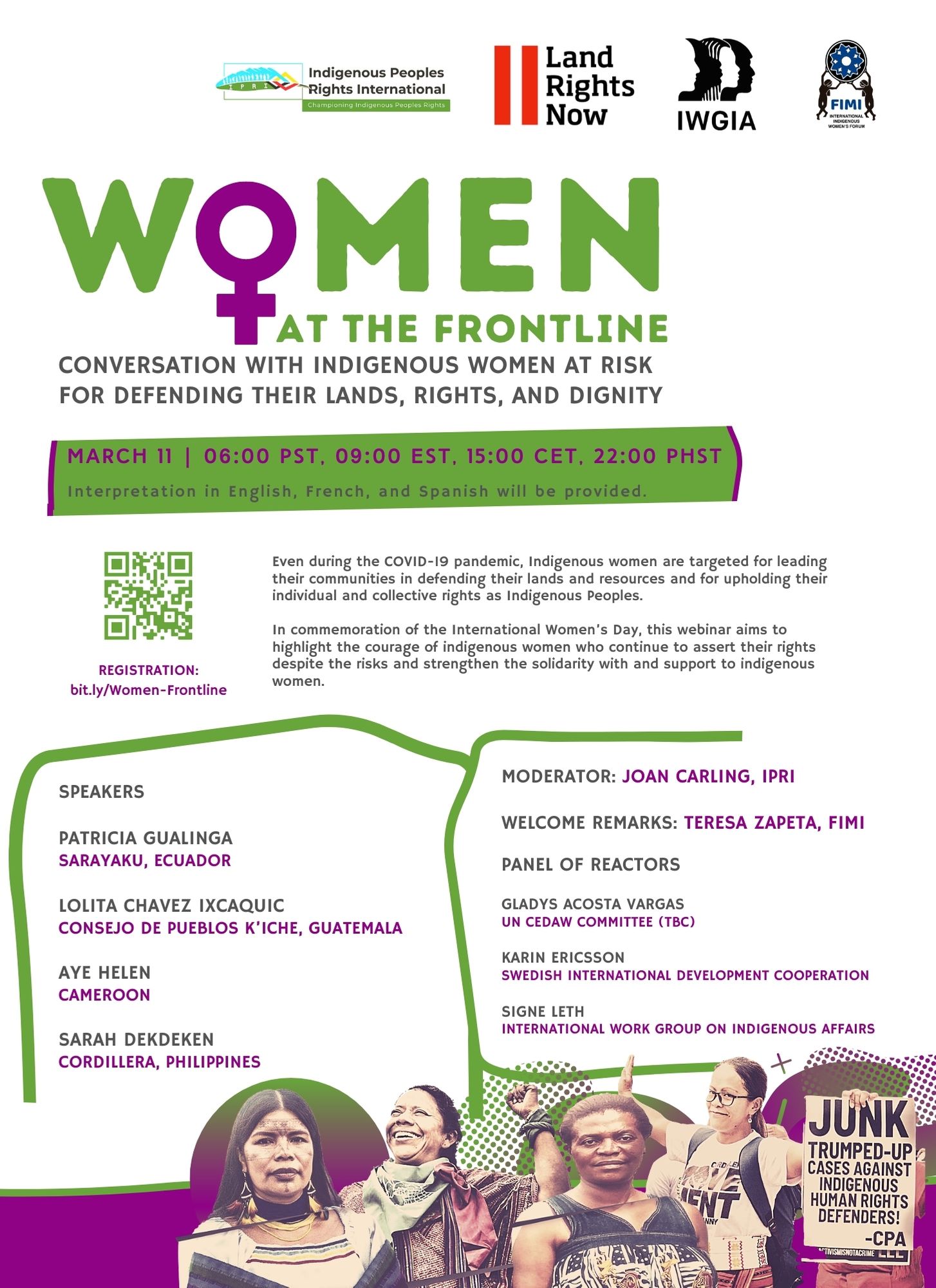
Background and Objectives
Even during the COVID-19 pandemic, attacks against Indigenous Peoples have intensified in several countries as governments and businesses continue with their control and exploitation of lands and resources. Indigenous women are targeted for leading their organizations and communities in defending their lands and resources, and their individual and collective rights as Indigenous Peoples. The attacks against indigenous women have profound impacts and consequences based on their gender-specific conditions and roles.
In commemoration of the International Women’s Day on March 8, IPRI, together with FIMI, IWGIA and LRN, organize a webinar that intends to highlight the courage of indigenous women in the overall struggle of Indigenous Peoples. This serves as a platform for frontline indigenous women at risk to tell their stories and discuss what the international community can do in solidarity with indigenous women and Indigenous Peoples.
Program
This event features four indigenous women at risk from different regions. They will share their stories in a conversational format with the moderator. It will be followed by brief responses from representatives from the UN system, the government, and advocate organizations. After the brief presentations, there will be an interactive discussion on how to strengthen solidarity and actions to support indigenous women who are at the frontline of Indigenous Peoples’ struggle for land, rights, and dignity.
The IPRI and LRN will also run a series of stories that feature indigenous land rights defenders at risk participating in this webinar and other indigenous women from March 8 to 12, as part of the commemoration of the International Women’s Day. This series will be available on the social media platforms of IPRI, LRN, and their partners.
Speakers
-
Sarah “Bestang” Dekdeken
Cordillera, Philippines
Sarah belongs to the Kankanaey-Igorot indigenous people in the Cordillera region, northern Philippines. She is a long-time indigenous activist who advocates against corporate mining, mega-dams, and other destructive projects in the Cordillera. She is currently the Secretary General of the Cordillera Peoples Alliance (CPA), an alliance of 307 of indigenous peoples’ and sectoral organizations.
Bestang is among the victims of the Philippine government’s attacks against activists and human rights defenders. Bestang has been experiencing intensified red-tagging, terrorist labeling and political vilification especially during the COVID-19 pandemic. It went as far as maligning her on social media as having a romantic relationship with CPA Chairperson, Windel Bolinget. She currently faces a trumped-up case of cyber libel filed by the Cordillera police chief for speaking out against the police’s desecration of a Cordillera heroes’ monument.
-
Patricia Gualinga
Sarayaku, Ecuador
Patricia is an indigenous leader from the Kichwa community of Sarayaku, in the Ecuador Amazon region. She has been the national and international spokesperson of their community in their fight against oil concessions in the Sarayaku territory. Their opposition has been met with increasing violence against the community, despite a favourable ruling of the Inter-American Court of Human Rights in 2012, in which she was actively involved. During all these years Patricia has been routinely subjected to threats, harassment and criminalization. Her home was attacked in 2018, when she received death threats.
-
Lolita Chavez Ixcaquic
Consejo de Pueblos K’iche, Guatemala
Lolita is a member of the Council of the K’iche Peoples for the Defence of Life, Mother Nature, Lands and Territories (CPK), a council of several indigenous K’iche communities against logging, hydroelectric dams and other extractive activities that affect their lands and self-determination. She is also a strong advocate of women´s rights.
Due to her active involvement in mobilizations and activities opposing extractives activities, Lolita suffered several attacks and threats since 2012. Despite the protection measures provided by the Guatemalan government, Lolita had to leave Guatemala under the HRD protection program of the Basque Government of Spain and later of the European Union because of the increased death threats she receives.
She has not been able to return to Guatemala since 2017. During her exile, she continues to promote the rights of Indigenous Peoples and indigenous women and denounce the situation in Guatemala. She was selected for the EU Sajarov human rights prize in 2017.
-
Aye Helen
Cameroon
Aye is one of the most active Indigenous women in Central Africa. She is from the Baka Indigenous Peoples in the east region of Cameroon. For over 25 years, Aye has been struggling for the rights of Indigenous Peoples and has faced threats from those who are exploiting the resources of Indigenous Peoples.
She has represented Indigenous Peoples in decision-making structures such as the council of Abong Mbang, where she was a councilor until the last council election. She is also the national coordinator of Indigenous Peoples and member of many platforms working to promote the rights of Indigenous Peoples in Cameroon and Africa. Aye is considered as one of the most experienced indigenous women who has faced tough challenges but persists in the promotion of Indigenous Peoples both in Cameroon and beyond.
Panel of Reactors
- Gladys Acosta Vargas
Member, UN CEDAW Committee (TBC)
- Karin Ericsson
Programme Specialist for Gender Equality, Swedish International Development Cooperation
- Signe Leth
International Work Group on Indigenous Affairs
Welcome Remarks: Teresa Zapeta, Foro Internacional de Mujeres Indígenas
Moderator: Joan Carling
Director, Indigenous Peoples Rights International

